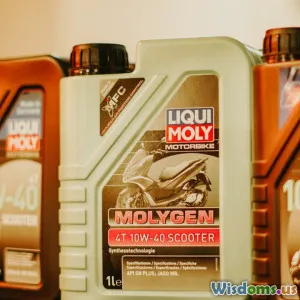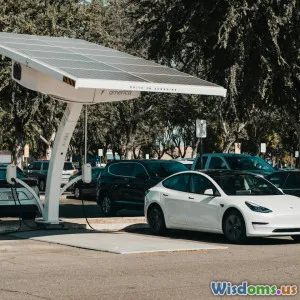
Why Your Next Car Might Never Need a Traditional Oil Change
9 min read Discover why traditional oil changes are becoming obsolete with innovative car technologies and what it means for the future of vehicle maintenance. (0 Reviews)
Why Your Next Car Might Never Need a Traditional Oil Change
Imagine buying a car and never having to schedule the dreaded oil change again. This might sound like wishful thinking, but advances in automotive technology are rapidly moving this possibility into reality. Traditional oil changes, once the cornerstone of vehicle maintenance, are on the decline due to breakthroughs in engine design, synthetic lubricants, and the rise of electric vehicles (EVs). In this article, we will unpack the technological revolution behind this trend, explore real-world examples, and understand the implications for car owners and the environment.
The Historical Significance of Oil Changes
Oil changes have long been essential for maintaining internal combustion engine (ICE) vehicles. Engine oil lubricates metal parts, reduces friction, dissipates heat, and helps protect the engine against wear and corrosion. Traditionally, owners were advised to change their engine oil every 3,000 to 5,000 miles. However, this routine was a compromise rather than an exact science, often dependent on oil quality and usage conditions.
But why do oil changes exist at all? As the engine operates, fuel combustion produces contaminants that degrade oil’s properties. Over time, oil becomes sludge, clumps, and loses viscosity – impairing its protective qualities. Change the oil regularly, and you remedy this decay, extending engine life. If you don’t, the engine risks damage, diminished efficiency, and failure.
That said, as vehicle technology advances, the rationale behind frequent oil changes is shifting dramatically.
Synthetic Oils and Extended Drain Intervals
One crucial technological leap has been the invention and widespread adoption of synthetic motor oils. Synthetic oils contain engineered molecules that possess enhanced thermal stability, oxidation resistance, and lower volatility than conventional mineral oils.
For example, American Petroleum Institute (API) has noted that synthetic oils can last two to three times longer than conventional oils. Modern synthetic oils coupled with advanced oil monitoring systems can safely extend oil change intervals up to 10,000 or even 15,000 miles in many new vehicles. Some luxury brands, such as Audi and BMW, officially recommend intervals this long.
Moreover, real-time oil analysis systems installed in modern engines alert drivers when oil performance truly declines rather than sticking to a rigid schedule. Technologies like Cadillac’s Oil Life Monitoring System have turned oil changes into data-driven events — requiring service only when necessary. This approach means many drivers will naturally reduce or even eliminate unnecessary oil changes.
Engine Technology Evolution: Reducing Dependence on Oil
Alongside better oil, modern engines themselves have evolved to be cleaner, more efficient, and less reliant on frequent lubrication. For instance, variable valve timing and turbocharging reduce engine loads, which helps keep operating temperatures ideal for oil longevity.
Plus, some manufacturers have adopted unique engine coatings—like diamond-like carbon (DLC) coatings—that reduce friction and wear, lessening the burden on engine oil. Toyota’s Dynamic Force engines illustrate refined engineering aimed at efficiency and longevity, thus requiring less frequent oil maintenance.
Additionally, mild-hybrid systems with integrated starter-generators improve engine stops and starts. These hybrids reduce idling, thereby reducing engine temperature stress, preserving oil quality longer.
Electric Vehicles: The Game Changer
Arguably, the most revolutionary change in automotive maintenance comes with electric vehicles. EVs have no traditional internal combustion engine—meaning no engine oil at all.
According to the U.S. Department of Energy, electric vehicles have 10 times fewer moving parts than gasoline cars, significantly reducing maintenance needs. The electric motor uses different lubrication systems, usually sealed-for-life greases, eliminating the need for frequent driver intervention.
Tesla, Nissan Leaf, Chevrolet Bolt, and other popular EVs boast maintenance schedules requiring no oil changes, drastically reducing lifetime vehicle expenses.
In addition to no oil changes, regenerative braking in EVs extends brake life, and the absence of exhaust systems eliminates corrosion-related issues common in traditional cars.
Real-World Examples and Data
Look at Tesla’s Model 3, one of the best-selling EVs globally. Owners report zero oil change requirements over hundreds of thousands of miles. Similarly, a comprehensive study from Consumer Reports found that EV owners save over $1,000 in maintenance costs in the first five years compared to gasoline counterparts.
Longer oil change intervals have also been observed in cars equipped with synthetic oil and oil monitoring technology. For instance, a 2022 J.D. Power study revealed an increasing average oil change interval rising from 5,000 miles in 2010 to upwards of 7,500-10,000 miles today for many vehicles.
These shifts mark a clear departure from traditional vehicle care paradigms.
Environmental and Economic Impacts
Reducing or eliminating oil changes has wide-reaching benefits:
-
Environmental Benefits: Less used oil means reduced waste oil, lowering pollution risks. According to the U.S. Environmental Protection Agency, improperly disposed motor oil accounts for roughly 40% of water pollution. Extended oil life or zero oil use helps mitigate this.
-
Cost Savings: Consumers avoid oil change costs, which average $40–$70 per service. Over a typical 10-year ownership, this can amount to hundreds of dollars saved.
-
Resource Efficiency: Fewer oil changes reduce oil extraction and refining demand, aligning with global sustainability goals.
What Does This Mean for Consumers?
While traditional oil changes may not disappear completely overnight, these trends indicate major changes:
-
Longer Service Intervals: Expect much longer times between oil changes if you drive a modern gasoline or hybrid car.
-
Shift to EVs: Greater adoption of EVs will phase out all oil changes over time.
-
Diagnostic Reliance: Vehicle “dashboards” will increasingly tell you when and what services you need rather than relying on fixed schedules.
-
Maintenance Culture Change: As vehicles require different care, consumers must adapt by learning new maintenance habits or embracing professional diagnostics.
Ultimately, your next car—especially if electric or hybrid—is likely to save you time, money, and effort from traditional oil change routines.
Conclusion
The automotive world is undergoing one of its most profound transformations. Improvements in synthetic oils, engine technology, and notably the ascent of electric vehicles are rendering traditional oil changes obsolete for many drivers. Beyond convenience, these changes promote environmental stewardship and cost savings.
So the next time you're researching your next car, consider this: you may be purchasing a vehicle designed to never need a traditional oil change. That’s more than a convenience—it’s a glimpse into the future of sustainable, advanced transportation.
Take Action
If you're buying a new car soon, investigate its oil change policy and maintenance requirements. If you own a gasoline vehicle, switch to synthetic oils and use oil life monitoring to extend intervals responsibly. And if you’re contemplating an EV, rejoice in the fact that the 'oil change' chapter may not apply to you at all.
The future is here—and it’s oil change-free.
Rate the Post
User Reviews
Popular Posts





















